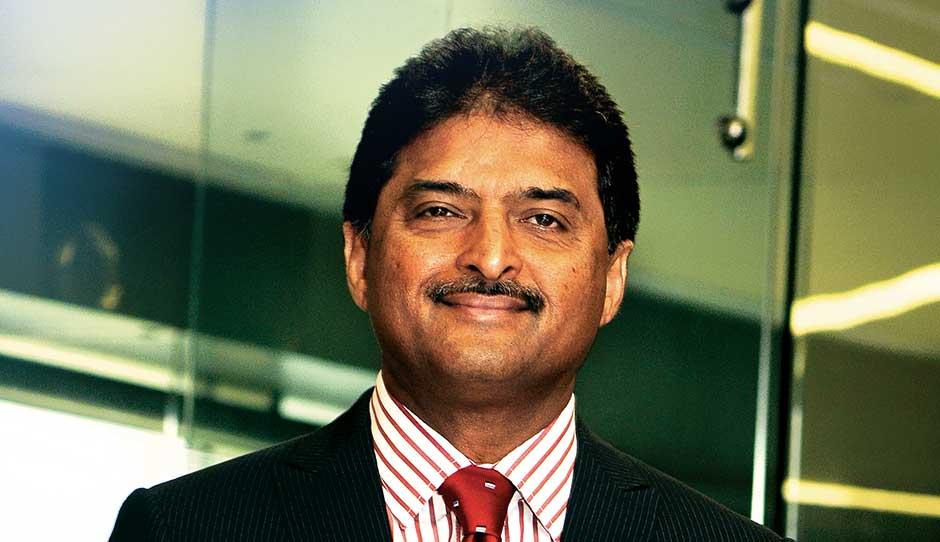Of Grit, Passion and Luck: Shashi Kiran Shetty
- BY Sonal Khetarpal
 In
In  22749
22749 0
0

Shashi Kiran Shetty landed in Mumbai in 1978—a young, bright-eyed teenager on the lookout for a job. His search led him to the Mumbai port where he fell in love with ships at the first sight. He worked patiently for the next four years, gleaning every aspect of the shipping business while nurturing a dream of owning his own fleet. In 1982, he started a small transportation company and eventually launched All Cargo Global Logistics. He's found gold in the high seas since. All Cargo Global Logistics is now a Rs 3,000 crore shipping giant.
I grew up in a joint family in Bantwal, a village that is an hour’s drive from Mangalore. When you grow up in a large family like mine, you learn a lot of things like the value of teamwork, building relationships, interdependence and humility. Those were my earliest lessons in entrepreneurship, and pretty crucial ones.
By the time I finished college with a degree in commerce, the family business of rice and oil mills was almost sinking. I knew I had to look for a job fast. I landed in Mumbai in 1978, hunting for work. Luckily, I got hired by this small shipping company called Intermodal Transport and Trading Systems. I knew nothing about ships but I worked hard to learn. From there, I moved on to Tata Group’s Forbes Gokak. I worked for four years in the Mumbai dockyards as an operations executive.
I believe that to truly succeed in any business, you must first love doing what you do. I had never seen a ship till I went to Mumbai’s dockyards to look for a job. When I finally saw one, I fell in love. The huge vessels carrying shipments from one place to another fascinated me. I knew this was the business for me. But, I wanted to own ships and not just work in them. I’d already begun dreaming of the day when I would have my own fleet.
I used my time as an employee productively, making friends and building networks in the industry. I met everybody—captains, managers, dockyard staff and truck owners who transported the cargo. Soon, I realised that many of those involved in the operations, especially those in charge of unloading and the Less than Container Load or LCL business didn’t really understand shipping.
I saw this as an opportunity. The cargo business was the easiest to start with since it needed less capital and also because I’d been doing this for four years. But all I had was 25,000. I had to think of ways to get started so I asked a few truck owners I knew to give me trucks on hire. I also convinced shipping companies to pay me daily, not monthly. They took a chance on me. Finally, TransIndia Freight Services was born. We were mainly a transportation company catering to shipping liners. I invested every penny I earned to buy equipment. I also hired professionals and set up a strong financial system. I’d seen my family business suffer because no one had bothered to think about checks and balances. I wasn’t about to repeat those mistakes.
We were the first Indian shipping company to buy a foreign shipping firm. That made us proud.
By 1993, winds of liberalisation were blowing. It was the right time to move into the shipping business. All Cargo Global Logistics was launched to ship cargo overseas. I got to know of a Belgian firm, called AMI International, which was looking to expand its LCL business to Indian shores. I became their franchisee in India. This helped me recruit more people at All Cargo.
We grew phenomenally over the next five years. By 1998, we had 18 offices across India. AMI had moved out by then and we were scouting for a global partner. That’s when ECU Line, another Belgian company, but a much larger one, came into the picture.
I worried though that ECU would use us to strengthen its India presence and then go on its own. So I proposed a joint office in Dubai. That diverted their attention away from India. We also set up joint ventures in Singapore, Mauritius and South Africa. It meant they had no time to focus on India, and we ran the show.
In 2003, we set up our first Contained Freight Station (CFS). It was the final link in the chain and made us a complete shipping solutions firm. We knew there was no space left in the CIDCO dockyard in Mumbai, so we went to a neighbouring village seven kilometres away. It was a huge risk because we didn't know if shipping companies would agree to dock so far from the main hub. But we got the land at a mere 10 per cent of the price I’d have to pay at the CIDCO dock.
The first CFC was a big success. Another CFC followed. This stirred investor interest in All Cargo and in 2004, we got private equity funds. At the same time, ECU Line's Belgian promoters were looking for an exit. Flush with funds, I knew it was the right time to increase our stake in the company.
The Belgians were shocked when I offered to be a 33 per cent shareholder. They weren’t expecting this. We raised $12 million by selling 6 per cent of All Cargo shares—we had become a listed firm by then—and coupled with the PE money, we sealed the deal in 2004.
Thereafter, we insisted on running the show. I appointed a senior colleague, M.P. Bansal, as the CFO and sent him to Antwerp. My intention was to own 50 per cent of ECU by 2007. Within a year, the promoters of ECU Line, plagued with further financial trouble, decided to offload their entire stake. We had grown substantially by then and in 2007 we bought them over for approximately Rs 150 crore. This has been my life’s biggest high. We were the first Indian shipping company to buy a foreign shipping firm. That made us proud.
It also felt good to be running a large multi-national shipping company and be listed on the stock exchange. I was living my dream of having a listed, public shipping company. It gives you a certain image, builds your credibility and helps attract talent.
Ironically, the acquisition also led to complications and brief setbacks. We’d initially decided to retain the promoters of ECU Line as board members to maintain continuity. But, we found out that the main promoter had started another shipping and cargo business without even informing us. We had to fight a prolonged legal battle before the dust settled.
The incident shook me up. But I haven’t stopped trusting people. You can't do that just because some people let you down. There are enough good people around. What I did learn was the importance of protecting one’s interests.
Luckily, we haven't looked back since. The recession did hit us but it couldn’t cripple us. In fact, not only have we survived, we’ve also managed to increase our revenue and margins. That said, the LCL business was badly affected and the bottom line dropped by 40 per cent. The CFC business broke even. But because none of the committed projects were halted, our engineering business generated a lot of revenues. Around the same time, Blackstone pumped in around Rs 350 crore in All Cargo. That helped us ride out the storm.
My vision is to turn All Cargo into a billion-dollar company by 2014-2015. I also want to institutionalise the business so that it can be run by those who succeed me, whether they are family members or professional CEOs. Even after all these years, I still love what I do. Finally, that is what makes the difference.





























Add new comment